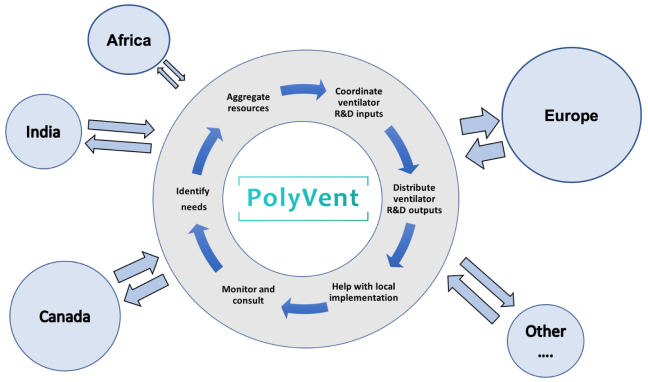PolyVent, a prototype open source pandemic ventilator that can be used to treat patients with severe Covid-19-related pneumonia or lung damage, was presented in Linz (Austria) last week. The machine was assembled by an international team of volunteer engineers and is one of the projects co-funded by the EU “EUvsVirus” Covid-19 challenge.
The goal of the project is to create an accessible ventilator design which can be used in times of shortage.
The machine, a combination of open source hardware and open source software, was unveiled after a two-week development sprint in the Tabakfabrik (‘Tobacco Factory’), an incubator managed by the city of Linz, Austria. The project involved specialists from countries including Austria, Australia, Canada, Germany, India, the Netherlands, and Russia.
The building of the prototype was part of a series of events in Linz known as Impact Innovation Weeks 2020. It brought together teams formed at the EUvsVirus Hackathon, which took place in April.
One of the companies involved, already based in the Tabakfabrik, suggested using the incubator’s ‘Grand Garage’ to combine all of the components. “One of Europe’s largest maker spaces, providing access to some 90 machines, is the perfect place for projects like ours,” Dr Victor Suturin, coordinator for the PolyVent project, told the European Commission’s Open Source Observatory.
Sponsoring
The Austrian city contributed to the project by providing unlimited amounts of materials, Dr Suturin said. Companies in the city helped cover the cost of accommodation for project participants, including three Canadians and one person from the Netherlands.
In late April, the pandemic ventilator was one of the winners of the EUvsVirus hackathon, involving over 60 specialists. Many of the primary components were designed by two young Canadians, Nathaniel Bechard and Austin Campbell. A physicist from the Netherlands, Antal Zuiderwijk, contributed experience from another ventilator project (Air-to-All).
A standard medical ventilator costs EUR 30,000 or more. The machine designed by PolyVent can be put together for about EUR 1,000 to 6,000 depending on the quality of materials used and the intended life-span of the apparatus.
Essential medical devices

PolyVent shows how open source hardware and open source software can democratise engineering of essential medical devices, Dr Suturin says. Companies can use the project to specialise in components, while countries can adapt the project to their own medical and certification requirements. “Our product creates a baseline scalable blueprint for ventilator production around the world,” Dr Suturin explains. “Making this entire process open is bound to create a cultural shift in how such machines will be built in the future.”
The project is now working on getting more engineers from Africa, Asia and North America onboard, inviting them to visit Linz to work on tailored versions of the pandemic ventilator.
More information:
PolyVent proposal at the EUvsVirus hackathon
ORF news item (in German)
Nachrichten news item (in German)
Tips news item (in German)
PolyVent at EASME

